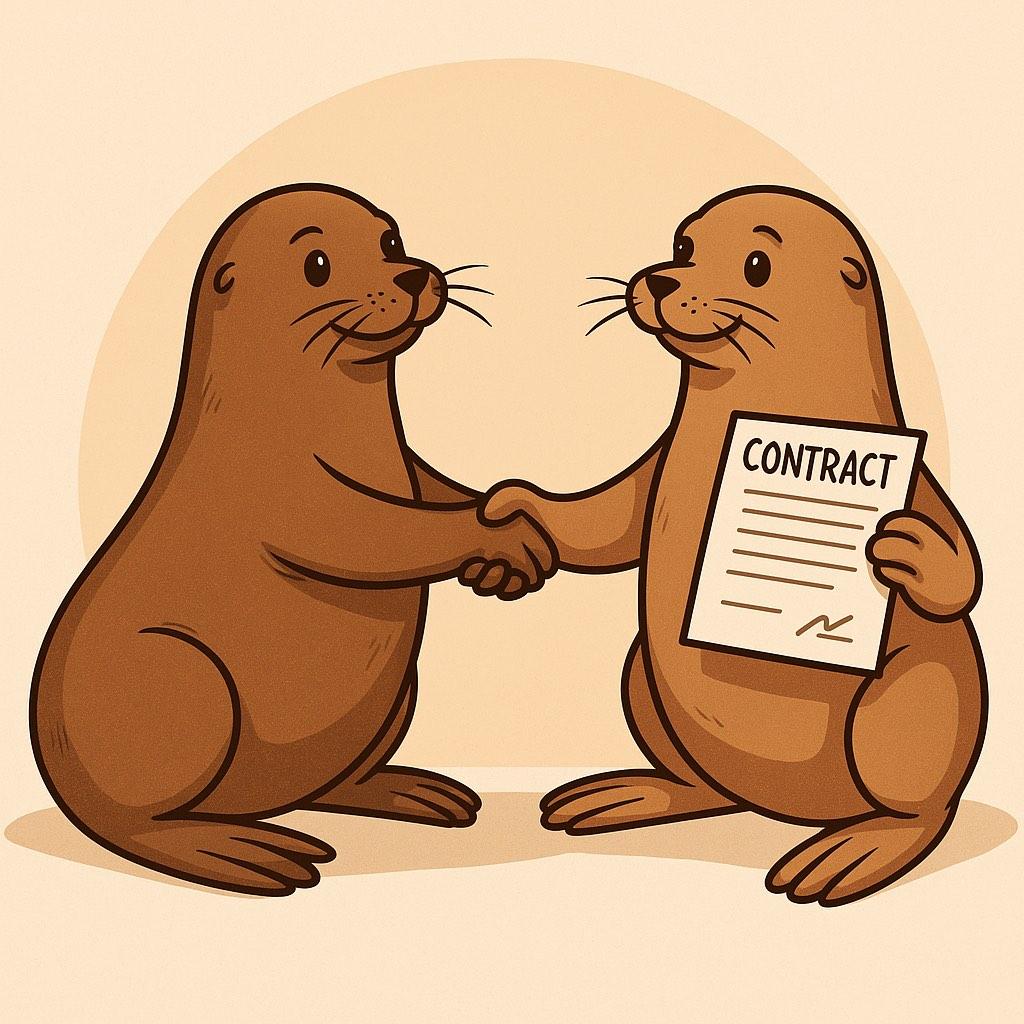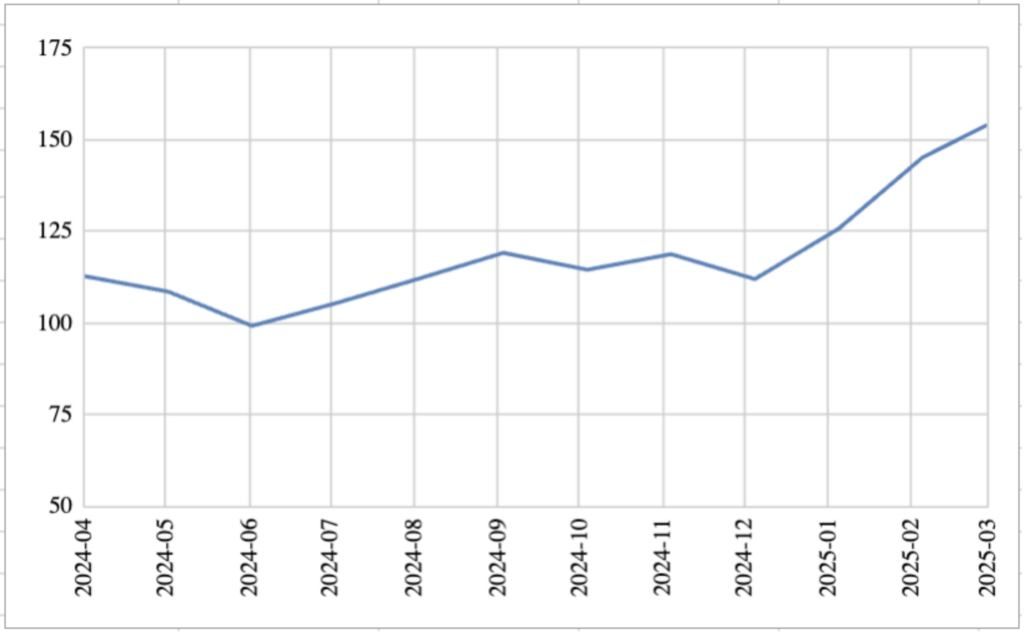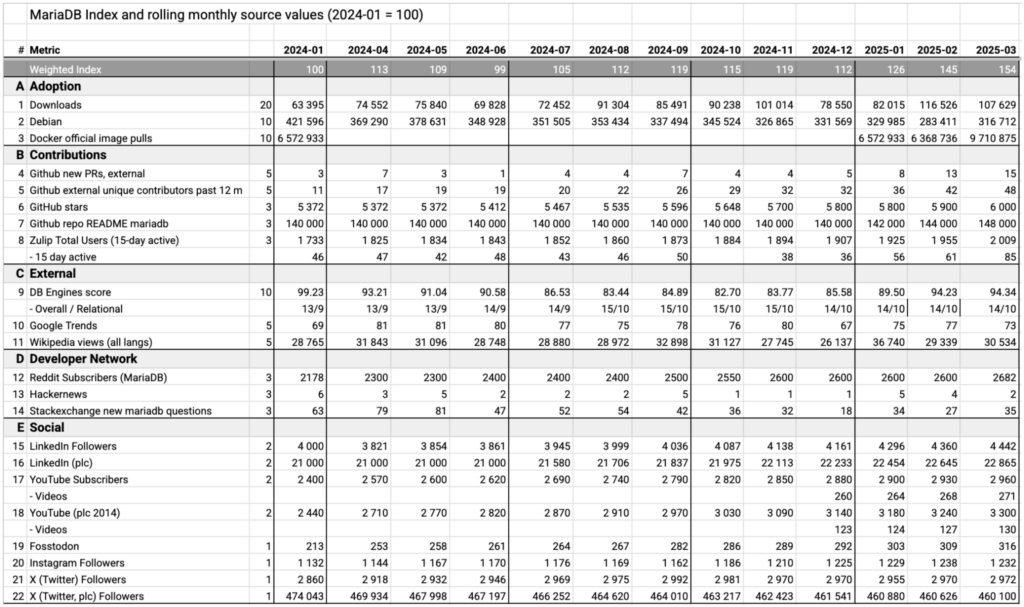This month in MariaDB Foundation: Mar 2025

March was a busy month in the world of MariaDB!
Let’s explore the progress through the lens of the Six Goals for 2025, introduced in January.
Board Meeting 1/2025: New Executive Chairman, new CEO
But before we dive into that, let me briefly highlight developments from the two most recent Board Meetings. In the Report from the Board blog post about the late February meeting, I already noted a key organisational change:
- I am transitioning my role to be Executive Chairman, providing the overall leadership vision for the transformation of the Foundation and expanding the Foundation’s presence and influence in the industry.
- Anna Widenius is taking over the operational leadership as CEO. She has already been informally operating as the “Operator in Chief”, making things happen at events, in marketing, between individuals both internal and external to the Foundation.
Let me once more congratulate Anna, and encourage you to read her blog The Accidental Queen of the Database Dominion – Month one. She shares her thoughts on the impostor syndrome, on strengthening ties with MariaDB plc, and on taking the road less patched. One passage in particular stood out to me:
- Every decision we make is tied back to our Foundation goals: Openness, Adoption, Continuity – also Quality, Inclusivity, and Innovation. It’s been heartening to see how much of the groundwork is already there — and how much potential there is to grow further. We’re not reinventing the wheel; we’re oiling the gears, charting new paths, and occasionally fixing that one wheel that insists on wobbling.
Board Meeting 2/2025: A deeper relationship with MariaDB plc
The second Board meeting from 12 March 2025 endorsed and approved a Memorandum of Understanding between MariaDB Foundation and MariaDB plc (depicted by the two sea lions shaking foreflippers above). On a high abstraction level, we agreed on jointly pursuing mutually aligned top goals:
- Adoption: Community growth by maximizing the number of users of MariaDB Server.
- Openness 1: Strive to maximize the number of contributions to MariaDB Server code and documentation by developers not employed by the Corporation.
- Openness 2: Strive to simplify the software engineering processes of MariaDB Server.
- Continuity 1: Strive to support the business of the Corporation, as the Primary Code Contributor MariaDB Server code.
- Continuity 2: Strive to support the long-term sustainability of the Foundation.
Lead forwarding of Open Source Qualified Leads
As part of the above MoU item Continuity 1, the Board decided to forward leads to MariaDB plc. This reinforces the Foundation’s role in supporting the long-term health of the ecosystem, while respecting the different mandates of Foundation and Corporation.
Back in Board Meeting 2/2022, we had already established the concept of the Primary Code Contributor. This was defined as “the code contributor of MariaDB Foundation that, during the past two years, has contributed the most code to MariaDB Server”, as determined annually by the end of March, based on statistics on the source code. Consequently, based on the code contribution statistics for 2022, 2023, and 2024, the Board formally recognised MariaDB plc as the Primary Code Contributor for all three years.
However, when the Primary Code Contributor concept was established in 2022, it did not grant any special privileges to its holder. The only thing done in the area of lead forwarding was that since 2018, web visitors who have completed their download of MariaDB Server have been automatically redirected to a landing page https://mariadb.com/kb/en/postdownload/, where they are encouraged to create an account with MariaDB.com “to receive download release notifications, product updates and more” (a practice the Board decided to continue with).
The Board now also decided to award OQLs to MariaDB Corporation based on download statistics, web statistics, telemetry, and activities at both online and offline events and conferences – provided that the Corporation retains its status as Primary Code Contributor, as assessed annually by the end of March.
Quite a number of Board members shed light on the proposal from many directions, and we ended up unanimously approving the proposal. We also noted that the “MariaDB Foundation is from time to time to revise the conditions for lead forwarding”.
1. Community Analysis: Know where we stand!
As we blogged in January, it’s important for us to better know our users. We said we “explicitly want to grow and focus on the part of our community that we know on a first-name basis, something we’ve called our named community.” Hence, we have started following up our web visitors and downloaders. Being an Open Source company, we obviously want to follow privacy expectations such as GDPR in spirit and letter. We’ll do some follow-up based on IP addresses, but won’t retain the IP, nor keep any PII (Personally Identifiable Information).
To get a better insight into the perspective of Linux distributions, we had a conversation with Michal Schorm about MariaDB in Red Hat and Fedora (blog entry, video). We are happy to see Michal Schorm as our freshest new Board Observer, elected in March.

The MariaDB Adoption Index that we introduced last month grew from 145 in February to 154 in March. What stands out is that the Docker official image pulls jumped by 52% during March, but in all honesty, we don’t know why.
We made no changes to the composition of the index since last month, but we did get feedback to add brew installs and other distro numbers. We have since started collecting brew install numbers, and will tune the index in due course.

2. Contributions: Make MariaDB vibrant as a developer community!
One particular piece of good news we want to highlight from March is about the strong and growing support we’re getting from MariaDB plc in the area of contributions. While the formal Memorandum of Understanding items may seem terse …
- Code Review Collaboration:
The Corporation uses its best efforts to provide reviews of MariaDB Server code contributions within a reasonable time as needed. - Documentation Contributions:
The Corporation and Foundation jointly ensure that documentation (Knowledge Base) contributions are easy to make and appropriately reviewed. The Corporation shares view statistics of documentation with the Foundation, on the level of individual article views by month, on request of the Foundation.
… the spirit behind them is anything but. What we’re seeing in practice is real alignment, real effort, and a shared commitment to the goals we’ve set for the community — especially when it comes to Openness 1 and 2.
The “best efforts” we refer to are grounded in genuine goodwill at all levels of management — from the CEO to the VP of Software Engineering, Alex Hanshaw. Alex has led the way in refining internal MariaDB plc processes to ensure that code contributions receive timely and appropriate attention from MariaDB plc experts during sprint cycles.
Of course, some key developers will always be tied up with customer requests or urgent bug fixes. But thanks to Alex’s new approach, there’s now always someone ready to step in — ensuring that we can respond to community contributions “within a reasonable time”, as the MoU indicates.
As you can imagine, this requires a fair amount of behind-the-scenes coordination and effort. We’ll return to this topic in future updates.
On another note, we’ve taken active steps to bring more community input into our roadmap planning.
While community voting has long been a feature in the MariaDB issue tracker (Jira), it has often been overlooked in the past. To change that — and to gain clearer insight into what the community truly values — we’re now encouraging users to vote on feature requests.
Robert Silén outlines the initiative in his recent blog post: Give MariaDB Jira votes and comments. If you care about a particular feature, now is the time to make your voice heard!
3. Outreach: Evangelise the current and potential users to drive adoption!
The biggest event in March was CloudFest in Rust, Germany — and once again, MariaDB made its presence felt.
For the third year in a row, our founder Michael “Monty” Widenius attended, joined this time by our CEO Anna Widenius and VP of Engineering Vicentiu Ciorbaru.
As tradition has it, Monty served up some of his signature Irish Coffees, much to the delight of select CloudFest attendees — a small ritual that seems to grow in popularity each time.
Meanwhile, Anna has been working on refining our sponsorship benefits, with a particular focus on the Silver tier. Discussions at CloudFest proved valuable, and we expect to share more on this in our April update.
4. Vectors & AI: Bring in new users to MariaDB Server!
We kicked off a MariaDB AI RAG hackathon using MariaDB Vector, as introduced in Robert Silén’s blog: Join our AI Hackathon with MariaDB Vector.
The hackathon leads up to the Helsinki Python meetup, which the Foundation will be hosting in May. By the end of March, we had already received several submissions — thanks in large part to the energy and publicity from the awesome Helsinki Python community.
Check out Robert’s follow-up posts:
- Last chance to apply to AI RAG Hackathon
- One week left to join AI RAG Hackathon by Helsinki Python meetup.
5. Enable MySQL users to use MariaDB even more easily!
We live in a world where national interests intertwine with IT vendor interests. Interest is currently booming in “European Alternatives“. In the blog MariaDB, an Open Source Alternative, I noted that MariaDB Server is unaffected by considerations related to protectionism. “In fact, choosing Open Source protects the user – an individual, an organisation, or a government – from protectionism itself.”
6. MariaDB for Universities Program: Support database tuition with MariaDB!
Last but not least, we finally got the kickoff contribution that I have been dreaming of since we first had the idea in 2019, about working with universities. Let me quote from the MoU:
- The Corporation will release basic training materials for noncommercial use under the CC BY-NC-SA 4.0 license and grants the Foundation the rights (consents) to use the MariaDB trademark in the “MariaDB for Universities Program” designation.
- Once the training materials are released, the Foundation shall launch the “MariaDB for Universities Program”, with the primary goal to further the usage of MariaDB Server as a sample relational database in academic lectures in universities, and the secondary goal of giving all MariaDB developers and users access to quality training materials when learning RDBMS concepts, SQL syntax and DBA skills
- The Foundation shall release the lecture materials on GitHub in an open format (such as markdown) and facilitate the creation of an active community of contributors to the training materials.
You’ll hear more about this in April, once we’ve gone live with the materials. Anyway – big thanks to MariaDB plc for the initial spark!